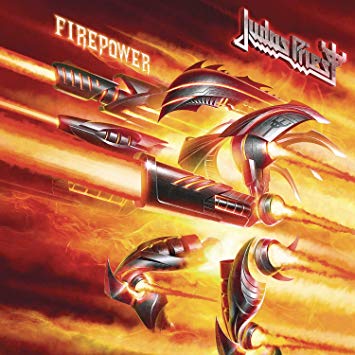So I finally got around to checking out the new Judas Priest album, 2018’s Firepower, and it’s okay. It’s fine.

I realize that there isn’t much one could say about a latter day Priest album that would make a dent culturally. For the diehard fans, the criteria are simple: don’t sound weak, and don’t repeat the misfire that was 2008’s Nostradamus. Firepower succeeds in both areas.
Yet, as I was listening through the album, I was not getting a sense of any feeling toward it, neither good nor bad, and that’s a problem. With a band like Priest, you really need to have a strong reaction, be it of wonder at just how good and unheralded a singer Rob Halford is (listen to “Last Rose of Summer” from 1977’s Sin After Sin or “Angel” from 2005’s Angel of Retribution for evidence), or the inherent, baked-in silliness of some of their better rockers. It’s that sort of goofy, throw-it-at-the wall attitude that often helped the NWOBHM vets surpass their peers. You need a word of a certain amount of syllables but “destructification” isn’t actually any word at all? Hell with it, stick it in.
At the same time, if these evil-sounding word salads don’t satisfy your nutrition requirements, let it be clear and unmistakable. When it comes to Priest, you should always feel either blazing hot or completely frigid, but never “meh.”
That’s the takeaway I got from Firepower, unfortunately. I sat and listened with my headphones on and, while nothing sounded at all inept, neither did anything sound particularly inspiring. Nearly every Priest record can be called upon to have a track that hooks you and brings you back again and again. For hardcore metalheads, that was the title track of 1990’s epic reset that was Painkiller. For the more album-oriented rock fans, it was “You’ve Got Another Thing Coming” from 1982’s Screaming For Vengeance. Give Tim “Ripper” Owens some credit here as well. Even on an album as difficult as the Halford-less Jugulator, ridiculous title and all, we got a great Priest track with “Cathedral Spires.”
The closest Firepower comes to that sticky hook of a song is “Lone Wolf,” which goes out of its way to sound heavy, but not in that machine-gun tempo that Judas Priest has been known for. It has a bit of roadhouse swagger to it, and just the faintest hint of Metallica’s “Sad But True.” It stands out because it is so contradictory to the rest of the record, but as a composition on its own, is also okay. It’s fine.
It should not be just fine. With each latter day release, we face the real possibility that this is the last. Even with so many band members having come and gone, key members have been with the group since 1974’s Rocka Rolla, and the pre-recording era of the group stretched back to 1969, with only bassist Ian Hill as the veteran representative throughout. K.K. Downing left the band in 2011. In 2018, Glenn Tipton revealed he had Parkinson’s Disease. Given that this could be the last shot, Firepower should have been awe-inspiring. Heavy? Yes, of course, but also a document of everything the band could do within that framework. I know of several longtime fans who are only interested in the heavy, and because Firepower gave it, they walk away satisfied by the record, and there’s nothing wrong with that. There is value in expecting (X) and getting (X).
I know I’m overthinking it, but because of where the band is in their lifetimes, this album should make you want more, and it should act as a final thesis, even if it turns out that it is not. You should really, really love it or really, really hate it. It should not just be textbook and competent, sonically on-point, but not wild enough to start any real revolution. I wish I could be more effusive, but Judas Priest’s Firepower is okay. It’s fine.